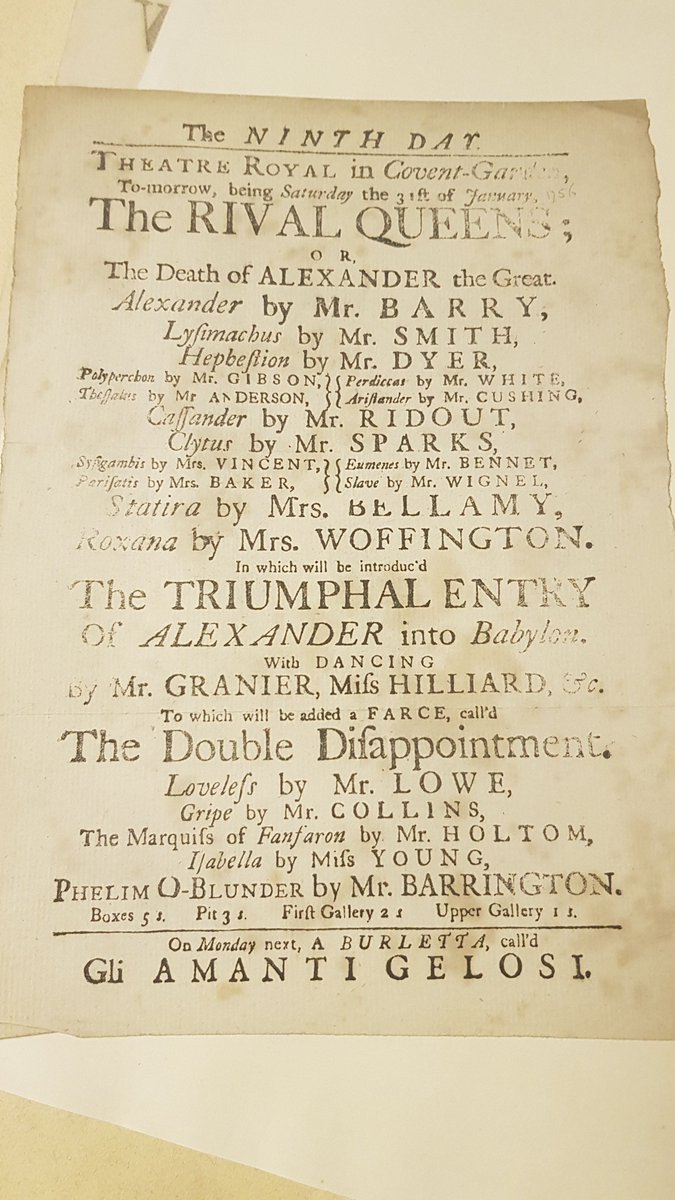Why are playbills so important for women on stage in the eighteenth century? Let's find out. This is the much-awaited THREAD 

We all know what a playbill is, right? Somewhat different from a theatrical programme, a playbill is generally a single-sheet form of advertising for a performance printed and disseminated in the days before a performance.
In London, playbills could be found pinned to walls and posts, on the tables of coffee shops, in private homes, in the theatre, and probably scattered on the floor (they really were everywhere).
Despite being, well, short, playbills can tell us A LOT about the mediation of women's performance in the eighteenth century (this is what my thesis is about).
As well as telling us what (might have) happened and when, they can tell us about trends in repertory and advertising practices, about the tastes of audiences, and about the importance of public image-making for actresses.
I say 'might have' because they weren't exactly reliable sources of information. Anything can happen between printing and a performance. In Elizabeth Blower's Maria (1785), Mr. Railton makes the mistake of writing a theatrical review before consulting the most recent bill:
'But judge any vexation when I discovered, the next morning, that the actors had exchanged parts the night before;--of course my criticism attested the public that I had not been present at the representation.' - Mr Railton is exposed as a fraud!
Women had a unique relationship with playbills, at the forefront of their sale from both sides of the stage. As @gea_russell has already said, the orange girl selling bills was the first point of contact with the theatre, selling bills with her own special kind of performance.
The most prominent textual aspect of a playbill is its names. And the naming of actresses is pretty important. David A. Brewer uses ideas of 'tactility' to highlight how authorial names could be used as a shorthand for value (or lack thereof).
Well playbills are pretty tactile. And in the same way authorial names often signify a persona that is beyond simply the humanity of a person, names on a playbill signify much more than just who is in a play.
For Charlotte Charke, her name on a playbill signified the LEGIBILITY of her performance - the recognition of her embodied performance as her own, and was important for her own public image-making:
'I must beg Leave to give the Reader an Idea of that Extacy of Heart I felt, on seeing the Character I was to appear in the Bills; though my Joy was somewhat dash'd when I came to see it inserted, By a young Gentlewoman, who had never appear'd on any Stage before...'
Julia H. Fawcett has talked of how this passage implies 'her legitimacy as a professional and as a wage-earner depends on her legibility as a name on the Drury Lane playbills.' Further, her initial anonymity steals from her a chance at building her own public persona through name
Later in her memoir, Charke talks of two male players who, unlike the superior Miss Ibbot, 'DEFORM'D' rather than 'PERFORM'D' their characters. Charke uses these words specifically, borrowing from the convention of the playbill.
These men are given 'Capital Distinctions', that is, primacy on the bill shown through their name in capital letters. And unlike these 'great men' who could rely on this puffing in the bills, Miss Ibbot is undervalued.
As Charke says, 'as Merit generally creates Envy,' without this puffing, Miss Ibbot's performance is interpreted as illegitimate and she is viewed with jealousy and disdain by her fellow performers.
Here Charke is most certainly playing with her own use of capitalised type: capitalisation bringing into clearer viewed the etymological significance of her word choice. A secondary meaning of 'performed' at the time is to make or create, to bring into form
In Charke's construction, the term is not only imagining the wording on the playbill but also juxtaposing with 'deform'd' - the improper personation, or formation, of acted figures by the 'great men' are emphasised by Charke's own capital formation.
So... I haven't really answered my question yet. But I'm still thinking through things. Thank you for sticking around and hopefully you are now a little more interested in playbills!

 Read on Twitter
Read on Twitter




